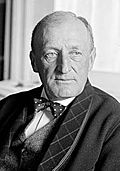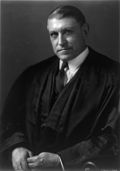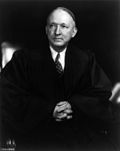| Case name | Citation | Opinion of the Court | Vote | Concurring opinion or statement | Dissenting opinion or statement | Procedural jurisdiction | Result |
|---|
| Great Northern Railroad Company v. Leonidas | 305 U.S. 1 (1938) | per curiam | 7-1 | none | Black (without opinion) | certiorari to the Montana Supreme Court (Mont.) | affirmed in part, and dismissed in part |
| Texas Consolidated Theatres, Inc. v. Pittman | 305 U.S. 3 (1938) | per curiam | 8-0 | none | none | certiorari to the United States Court of Appeals for the Fifth Circuit (5th Cir.) | certiorari dismissed |
| Polk Company v. Glover, County Solicitor | 305 U.S. 5 (1938) | per curiam | 7-1 | none | Black (opinion) | appeal from the United States District Court for the Southern District of Florida (S.D. Fla.) | reversed |
| Guarantee Trust Company v. Virginia | 305 U.S. 19 (1938) | McReynolds | 8-0 | none | none | certiorari to the Virginia Supreme Court (Va.) | affirmed |
| Colorado National Bank v. Commissioner of Internal Revenue | 305 U.S. 23 (1938) | McReynolds | 7-1 | Reed (short statement) | Black (opinion) | certiorari to the United States Court of Appeals for the Tenth Circuit (10th Cir.) | reversed |
| Davis v. Davis | 305 U.S. 32 (1938) | Butler | 8-0 | none | none | certiorari to the United States Court of Appeals for the District of Columbia (D.C. Cir.) | reversed |
| Davidson v. Commissioner of Internal Revenue | 305 U.S. 44 (1938) | Butler | 8-0 | none | none | certiorari to the United States Court of Appeals for the Eighth Circuit (8th Cir.) | affirmed |
| Schriber-Schroth Company v. Cleveland Trust Company | 305 U.S. 47 (1938) | Stone | 7-0[a] | none | none | certiorari to the United States Court of Appeals for the Sixth Circuit (6th Cir.) | reversed |
| Stahmann v. Vidal, Collector of Internal Revenue | 305 U.S. 61 (1938) | Roberts | 7-0[b] | none | none | certiorari to the United States Court of Appeals for the Tenth Circuit (10th Cir.) | reversed |
| Sovereign Camp of Woodmen v. Bolin | 305 U.S. 66 (1938) | Roberts | 8-0 | none | none | certiorari to the Missouri Court of Appeals (Mo. Ct. App.) | reversed |
| Helvering, Commissioner of Internal Revenue v. Winmill | 305 U.S. 79 (1938) | Black | 8-0 | none | none | certiorari to the United States Court of Appeals for the Second Circuit (2d Cir.) | reversed |
| Hines, Administrator of Veterans' Affairs v. Lowrey | 305 U.S. 85 (1938) | Black | 8-0 | none | none | certiorari to the New York Supreme Court (N.Y. Sup. Ct.) | reversed |
| Waialua Agricultural Company v. Christian | 305 U.S. 91 (1938) | Reed | 8-0 | none | none | certiorari to the United States Court of Appeals for the Ninth Circuit (9th Cir.) | reversed |
| Kellogg Company v. National Biscuit Company | 305 U.S. 111 (1938) | Brandeis | 6-2 | none | McReynolds and Butler (joint short statement) | certiorari to the United States Court of Appeals for the Third Circuit (3d Cir.) | reversed |
| General Talking Pictures Corporation v. Western Electric Company | 305 U.S. 124 (1938) | Brandeis | 5-2[a] | none | Black (opinion; joined by Reed) | certiorari to the United States Court of Appeals for the Second Circuit (2d Cir.) | affirmed |
| Welch v. Henry | 305 U.S. 134 (1938) | Stone | 5-3 | none | Roberts (opinion; joined by McReynolds and Butler) | appeal from the Wisconsin Supreme Court (Wis.) | affirmed |
| Harris v. Avery Brundage Company | 305 U.S. 160 (1938) | Black | 8-0 | none | none | certiorari to the United States Court of Appeals for the Seventh Circuit (7th Cir.) | affirmed |
| Stoll v. Gottlieb | 305 U.S. 165 (1938) | Reed | 8-0 | McReynolds (without opinion) | none | certiorari to the Illinois Supreme Court (Ill.) | reversed |
| Shields v. Utah Idaho Central Railroad Company | 305 U.S. 177 (1938) | Hughes | 8-0 | Black (without opinion) | none | certiorari to the United States Court of Appeals for the Tenth Circuit (10th Cir.) | reversed |
| Lyeth v. Hoey, Collector of Internal Revenue | 305 U.S. 188 (1938) | Hughes | 8-0 | none | none | certiorari to the United States Court of Appeals for the Second Circuit (2d Cir.) | reversed |
| Consolidated Edison Company v. National Labor Relations Board | 305 U.S. 197 (1938) | Hughes | 8-0 | Butler (opinion, concurring in part and dissenting in part; with which McReynolds concurred); Reed (opinion, concurring in part and dissenting in part; with which Black concurred) | none | certiorari to the United States Court of Appeals for the Second Circuit (2d Cir.) | affirmed as modified |
| Scher v. United States | 305 U.S. 251 (1938) | McReynolds | 8-0 | none | none | certiorari to the United States Court of Appeals for the Sixth Circuit (6th Cir.) | affirmed |
| California v. Latimer | 305 U.S. 255 (1938) | Brandeis | 8-0 | none | none | original jurisdiction | bill dismissed |
| McDonald v. Thompson | 305 U.S. 263 (1938) | Butler | 8-0 | none | none | certiorari to the United States Court of Appeals for the Fifth Circuit (5th Cir.) | affirmed |
| M.E. Blatt Company v. United States | 305 U.S. 267 (1938) | Butler | 8-0 | Stone (short statement) | none | certiorari to the United States Court of Claims (Ct. Cl.) | reversed |
| White v. United States | 305 U.S. 281 (1938) | Stone | 5-3 | none | McReynolds, Butler, and Robert (without opinions) | certiorari to the United States Court of Claims (Ct. Cl.) | affirmed |
| Helvering, Commissioner of Internal Revenue v. Chester N. Weaver Company | 305 U.S. 293 (1938) | Stone | 5-3 | none | McReynolds, Butler, and Robert (without opinions) | certiorari to the United States Court of Appeals for the Ninth Circuit (9th Cir.) | affirmed |
| Neblett v. Carpenter, Insurance Commissioner | 305 U.S. 297 (1938) | Roberts | 7-0[b] | none | none | certiorari to the California Supreme Court (Cal.) | affirmed |
| Inter-Island Steam Navigation Company v. Hawaii | 305 U.S. 306 (1938) | Black | 8-0 | none | none | certiorari to the United States Court of Appeals for the Ninth Circuit (9th Cir.) | affirmed |
| Armstrong Paint and Varnish Works v. Nu-Enamel Corporation | 305 U.S. 315 (1938) | Reed | 8-0 | none | none | certiorari to the United States Court of Appeals for the Seventh Circuit (7th Cir.) | affirmed |
| Missouri ex rel. Gaines v. Canada, Registrar of the University of Missouri | 305 U.S. 337 (1938) | Hughes | 6-2 | none | McReynolds (opinion; with which Butler concurred) | certiorari to the Missouri Supreme Court (Mo.) | reversed |
| Ex parte Century Indemnity Company | 305 U.S. 354 (1938) | per curiam | 8-0 | none | none | appeal from the United States Court of Appeals for the Ninth Circuit (9th Cir.) | show-cause rule discharged |
| United States v. Pleasants | 305 U.S. 357 (1939) | Hughes | 8-0 | none | none | certiorari to the United States Court of Claims (Ct. Cl.) | affirmed |
| Ford Motor Company v. National Labor Relations Board | 305 U.S. 364 (1939) | Hughes | 7-0[a] | none | none | certiorari to the United States Court of Appeals for the Sixth Circuit (6th Cir.) | affirmed (one case); certiorari dismissed (one case) |
| Patterson v. Stanolind Oil and Gas Company | 305 U.S. 376 (1939) | per curiam | 8-0 | none | none | appeal from the Oklahoma Supreme Court (Okla.) | dismissed |
| J. Bacon and Sons v. Martin | 305 U.S. 380 (1939) | per curiam | 8-0 | none | none | appeal from the Kentucky Court of Appeals (Ky.) | dismissed |
| Minnesota v. United States | 305 U.S. 382 (1939) | Brandeis | 8-0 | none | none | certiorari to the United States Court of Appeals for the Eighth Circuit (8th Cir.) | affirmed |
| Indianapolis Brewing Company v. Liquor Control Commission of Michigan | 305 U.S. 391 (1939) | Brandeis | 8-0 | none | none | appeal from the United States District Court for the Eastern District of Michigan (E.D. Michigan) | affirmed |
| Joseph S. Finch and Company v. McKittrick, Attorney General of Missouri | 305 U.S. 395 (1939) | Brandeis | 8-0 | none | none | appeal from the United States District Court for the Western District of Missouri (W.D. Mo.) | affirmed |
| United States v. Continental National Bank and Trust Company | 305 U.S. 398 (1939) | Butler | 6-2 | none | Stone (opinion; with which Black concurred) | certiorari to the United States Court of Appeals for the Seventh Circuit (7th Cir.) | affirmed |
| James v. United Artists Corporation | 305 U.S. 410 (1939) | Stone | 8-0 | none | none | appeal from the United States District Court for the Southern District of West Virginia (S.D.W. Va.) | affirmed |
| United States v. Algoma Lumber Company | 305 U.S. 415 (1939) | Stone | 6-0[a][c] | none | none | certiorari to the United States Court of Claims (Ct. Cl.) | reversed |
| Socony-Vacuum Oil Company v. Smith | 305 U.S. 424 (1939) | Stone | 6-1[a] | none | McReynolds (short statement) | certiorari to the United States Court of Appeals for the Second Circuit (2d Cir.) | affirmed |
| Gwin, White and Prince, Inc. v. Henneford | 305 U.S. 434 (1939) | Stone | 7-1 | Butler (opinion; joined by McReynolds) | Black (opinion) | appeal from the Washington Supreme Court (Wash.) | reversed |
| Princess Lida of Thurn and Taxis v. Thompson | 305 U.S. 456 (1939) | Roberts | 8-0 | none | none | certiorari to the Pennsylvania Supreme Court (Pa.) | affirmed |
| Helvering, Commissioner of Internal Revenue v. Owens | 305 U.S. 468 (1939) | Roberts | 8-0 | none | none | certiorari to the United States Court of Appeals for the Second Circuit (2d Cir.) | affirmed (one case); reversed (one case) |
| United States v. McClure | 305 U.S. 472 (1939) | Black | 8-0 | none | none | certiorari to the United States Court of Appeals for the Ninth Circuit (9th Cir.) | affirmed |
| Chippewa Indians of Minnesota v. United States | 305 U.S. 479 (1939) | Black | 8-0 | none | none | appeal from the United States Court of Claims (Ct. Cl.) | affirmed |
| Lyon v. Mutual Beneficial Health and Accident Association | 305 U.S. 484 (1939) | Black | 5-2[a] | none | Butler (short statement; joined by McReynolds) | certiorari to the United States Court of Appeals for the Eighth Circuit (8th Cir.) | reversed |
| Connecticut Railway and Lighting Company v. Palmer | 305 U.S. 493 (1939) | Reed | 6-1[d] | none | McReynolds (without opinion) | certiorari to the United States Court of Appeals for the Second Circuit (2d Cir.) | reversed |
| Baltimore and Ohio Railroad Company v. United States | 305 U.S. 507 (1939) | Reed | 8-0 | none | none | appeal from the United States District Court for the Southern District of New York (S.D.N.Y.) | affirmed |
| United States v. Powers | 305 U.S. 527 (1939) | McReynolds | 7-0[b] | none | none | certiorari to the United States Court of Appeals for the Ninth Circuit (9th Cir.) | affirmed |
| Pullman Company v. Jenkins | 305 U.S. 534 (1939) | Hughes | 7-0[a] | Black (opinion) | none | certiorari to the United States Court of Appeals for the Ninth Circuit (9th Cir.) | affirmed |
| Alton Railroad Company v. Illinois Commerce Commission | 305 U.S. 548 (1939) | Butler | 7-0[a] | none | Black (without opinion) | appeal from the Illinois Supreme Court (Ill.) | affirmed |
|











